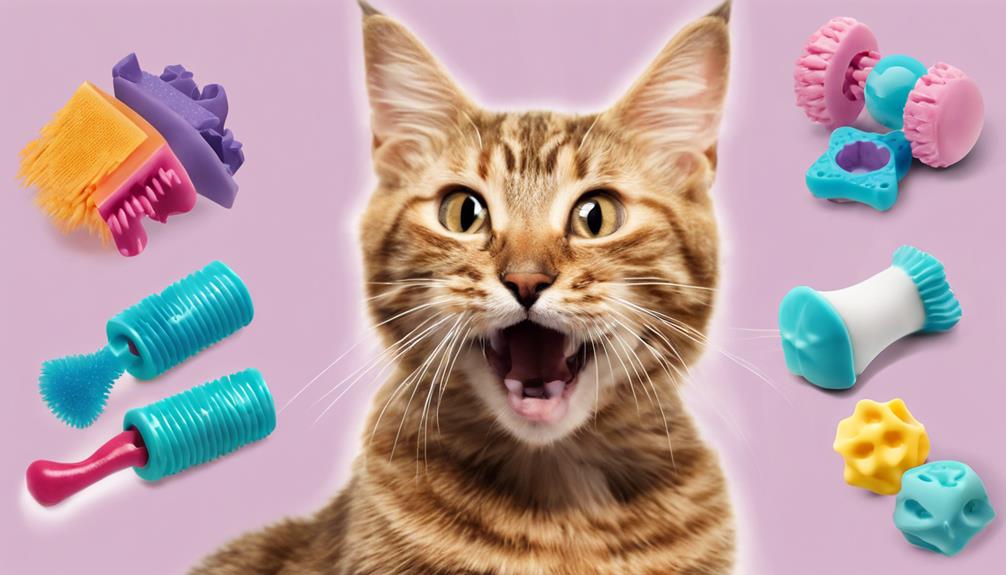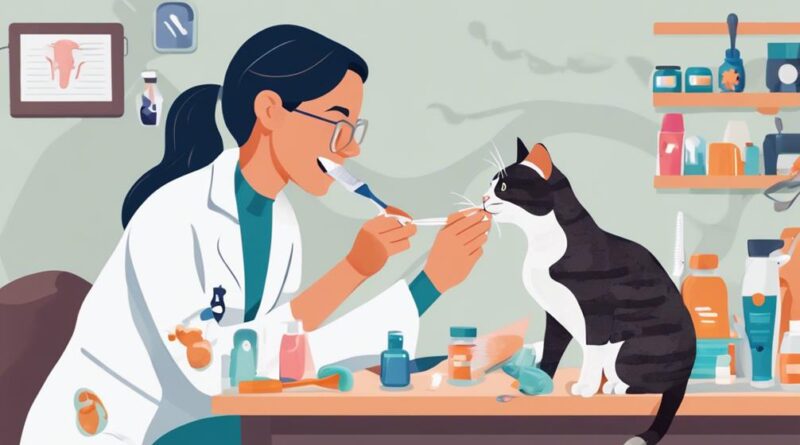6 Best Methods for Feline Dental Disease Prevention
Did you know that by the age of three, about 70% of cats have some form of dental disease?
Maintaining your feline's oral health is crucial for their overall well-being. From regular dental check-ups to specific dental diets and treats, there are several effective methods to prevent dental issues in your cat.
But what are the other three best ways to ensure your furry friend's dental health stays in top shape?
Let's explore these strategies together.
Importance of Feline Dental Health
Regularly maintaining your cat's dental health is crucial for preventing various oral issues and promoting overall well-being. Dental hygiene plays a significant role in your feline friend's overall health. Just like humans, cats can suffer from dental problems such as tartar buildup, gingivitis, and periodontal disease if their teeth aren't properly cared for.
To ensure your cat's dental hygiene is top-notch, preventive care is key. Start by introducing a dental care routine early in your cat's life. This can include brushing your cat's teeth regularly with a feline-friendly toothbrush and toothpaste. Additionally, providing dental treats or toys designed to promote oral health can also be beneficial. These simple measures can help prevent plaque and tartar accumulation, reducing the risk of more serious dental issues down the road.
Common Dental Issues in Cats
When it comes to feline dental health, cats commonly face a range of dental issues that can impact their overall well-being. Some of the common dental problems in cats include:
- Feline Gingivitis Prevention: Gingivitis, the inflammation of the gums, is a prevalent issue in cats. It can lead to discomfort, pain, and even loss of teeth if left untreated. Implementing preventive measures is crucial in combating feline gingivitis.
- Tooth Decay in Cats: Tooth decay, also known as dental caries, can occur in cats due to a combination of factors such as poor dental hygiene and diet. Cats with tooth decay may experience pain, difficulty eating, and bad breath.
- Periodontal Disease: This is a severe form of dental disease that affects the tissues supporting the teeth. It can result in tooth loss and impact the cat's overall health if not managed effectively.
- Broken or Fractured Teeth: Cats can break or fracture their teeth due to trauma, chewing on hard objects, or underlying dental disease. This can lead to pain, infection, and require prompt veterinary attention to prevent further complications.
Understanding these common dental issues in cats is essential for maintaining your feline companion's oral health and overall well-being. Proper dental care and regular veterinary check-ups are key to preventing and addressing these problems effectively.
Signs of Dental Disease in Cats
To recognize potential dental issues in your feline companion, pay attention to signs of dental disease that may indicate underlying problems with their oral health. Early detection is key to addressing dental problems promptly. Keep an eye out for symptoms such as bad breath, which can be a sign of dental issues like periodontal disease or gingivitis. Examine your cat's mouth for red or swollen gums, yellow or brown tartar buildup on the teeth, and any signs of pain or discomfort while eating.
Behavioral changes can also signal dental disease in cats. If your usually friendly and social cat becomes irritable or withdrawn, it could be due to oral pain. Cats may start drooling excessively, pawing at their mouth, or avoiding hard food if they're experiencing dental problems. Weight loss or a change in eating habits, such as only eating on one side of the mouth, can also be indicators of dental issues.
Observing your cat's behavior and monitoring their oral health regularly can help you catch dental problems early. If you notice any of these signs, it's essential to consult with your veterinarian for a thorough dental examination and appropriate treatment. Remember, proactive care and prompt attention to dental concerns can help keep your feline friend healthy and happy.
Regular Dental Check-ups for Cats
Schedule annual dental check-ups for your cat to ensure their oral health is monitored regularly by a professional veterinarian. Regular dental check-ups are crucial in maintaining your cat's overall well-being and preventing dental diseases. Here are some key points to consider:
- Dental sedation for cats: Some cats may require dental sedation for a thorough examination and cleaning. Discuss with your veterinarian the necessity of sedation based on your cat's behavior and the extent of the procedure.
- Anesthesia risks: Understand the risks associated with anesthesia during dental procedures. Your vet will assess your cat's health to minimize any potential complications and ensure a safe experience.
- Pet insurance for dental: Consider investing in pet insurance that covers dental care. It can help alleviate the financial burden of unexpected dental procedures and encourage proactive dental health management.
- Cost considerations: Dental check-ups and treatments can vary in cost. Discuss the expenses involved in advance with your veterinarian to plan accordingly and explore any available payment options or financing.
Dental Diets and Treats for Cats
Consider incorporating dental diets and treats into your cat's daily routine to promote oral health and prevent dental issues. Dental health supplements can be beneficial in maintaining your cat's oral hygiene. These supplements are designed to support dental health by reducing plaque and tartar buildup, freshening breath, and improving overall gum health. Look for supplements recommended by your veterinarian and follow the instructions for proper dosage and administration.
In addition to dental health supplements, you can also introduce homemade dental treats into your cat's diet. Homemade dental treats can be a fun and effective way to help keep your cat's teeth clean. You can make simple treats using ingredients like catnip, parsley, or even coconut oil, which can help reduce bacteria in your cat's mouth. Just ensure that the ingredients are safe for feline consumption and avoid using harmful additives like sugar or artificial flavors.
Brushing Your Cat's Teeth
Begin by gently introducing your cat to the concept of teeth brushing using positive reinforcement and gradual acclimation techniques. Cats may be resistant at first, but with patience and the right approach, you can make teeth brushing a part of their routine. Here are some tips to help you get started:
- Start Slow: Introduce your cat to the toothbrush and dental hygiene products gradually. Let them sniff and investigate these items before attempting to brush their teeth.
- Use Tasty Toothpaste: Choose a toothpaste specifically designed for cats, with flavors like chicken or fish that they enjoy. This can make the experience more pleasant for your feline friend.
- Be Gentle: When you begin brushing, start by gently massaging their gums with your finger to get them used to the sensation. Then, slowly introduce the toothbrush in a calm and reassuring manner.
- Stay Positive: Praise and reward your cat after each brushing session. Positive reinforcement goes a long way in making the experience more enjoyable for them.
With consistent training and patience, you can help maintain your cat's dental health through regular teeth brushing. Remember, a little effort now can prevent potential dental issues in the future.
Dental Toys and Chews for Cats

To further enhance your cat's dental health beyond brushing, explore incorporating dental toys and chews into their routine. Dental playtime with interactive toys can help keep your cat's teeth clean by promoting chewing and gnawing, which can reduce plaque and tartar buildup. Interactive toys that encourage your cat to chew or play actively can also provide mental stimulation, keeping your feline friend engaged while supporting their dental health.
Chew treats specifically designed for dental benefits are another excellent option to consider. These treats are often formulated to help control plaque and tartar, promoting better oral hygiene for your cat. When your cat chews on these treats, they can help scrape away plaque and prevent it from hardening into tartar, ultimately contributing to fresher breath and healthier gums.
When selecting dental toys and chews for your cat, look for products that are safe, durable, and recommended by veterinarians. Always monitor your cat while they're using these toys to ensure they're chewing safely and not at risk of ingesting any small parts. By incorporating dental toys and chew treats into your cat's routine, you can take proactive steps to improve their dental hygiene and overall well-being.
Professional Dental Cleanings for Cats
Exploring professional dental cleanings as a crucial aspect of maintaining your cat's oral health can significantly contribute to preventing dental diseases and ensuring overall well-being for your feline companion. Regular professional cleanings help in removing plaque and tartar buildup, preventing gum disease, and addressing any underlying dental issues early on.
Here are some key points to consider when contemplating professional dental cleanings for your cat:
- Anesthesia Risks: Understand the risks associated with anesthesia during dental cleanings, especially for older cats or those with pre-existing health conditions. Discuss alternative options with your veterinarian to minimize these risks.
- Cost Considerations: Evaluate the cost of professional dental cleanings and consider it as an investment in your cat's long-term health. Some veterinary clinics offer dental cleaning packages that may be more affordable than individual sessions.
- Frequency: Determine how often your cat may need professional dental cleanings based on their oral health status and individual needs. Your veterinarian can provide guidance on the ideal frequency.
- Follow-Up Care: After a professional dental cleaning, inquire about follow-up care and maintenance strategies to prolong the benefits of the cleaning. This may include at-home dental care routines recommended by your veterinarian.
Frequently Asked Questions
Can Dental Disease in Cats Lead to Other Health Issues Beyond Just Dental Problems?
Dental disease in cats can definitely lead to other health issues beyond just dental problems. Neglecting your cat's dental health can impact their overall well-being.
Common misconceptions may downplay the severity of dental issues, but they can cause pain, infections, and even affect organs like the heart and kidneys.
Regular dental care and check-ups are crucial for your cat's overall health and can prevent more serious complications down the road.
Are There Any Natural Remedies or Supplements That Can Help Prevent Feline Dental Disease?
To help prevent feline dental disease, you can consider herbal remedies like essential oils or dietary supplements such as probiotics. These natural options may support your cat's oral health.
Always consult with your vet before introducing new supplements to your cat's diet.
Remember that proper dental care, including regular cleanings and check-ups, is also crucial in preventing dental issues in your feline friend.
How Often Should I Change My Cat's Toothbrush or Dental Toys to Ensure They Are Effective?
To keep your cat's oral hygiene in check, remember to maintain the toothbrush regularly and rotate dental toys consistently.
Ensure proper cleaning of the toothbrush and monitor toy durability to gauge when replacements are needed.
Are There Any Specific Breeds of Cats That Are More Prone to Dental Issues?
Certain cat breeds possess a genetic predisposition towards dental issues. Factors like jaw structure and tooth alignment can influence oral health.
Breeds like Persians and Siamese are more prone to dental problems. Regular dental care, including toothbrushing and dental treats, can aid in prevention.
Can Feline Dental Disease Be Contagious to Other Pets in the Household?
Feline dental disease is generally not contagious to other pets in your household, so no need to worry about transmission risk. However, it's still important to maintain good dental care for all your furry friends.
To prevent any potential issues, coordinate dental care routines for all pets in your multi-pet household. Regular brushing and dental check-ups can help keep their teeth and gums healthy.
Conclusion
In conclusion, maintaining your cat's dental health is crucial for their overall well-being.
By incorporating regular dental check-ups, dental diets, brushing their teeth, and providing dental toys, you can help prevent dental disease and keep your feline friend's teeth clean and healthy.
Remember, a healthy mouth means a healthier cat, so make sure to prioritize their dental care to ensure they live a long and happy life.
